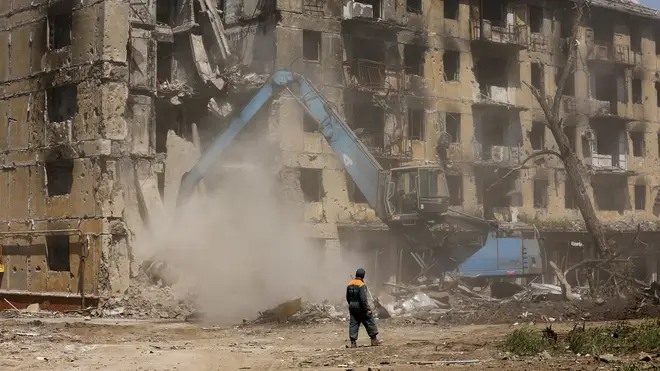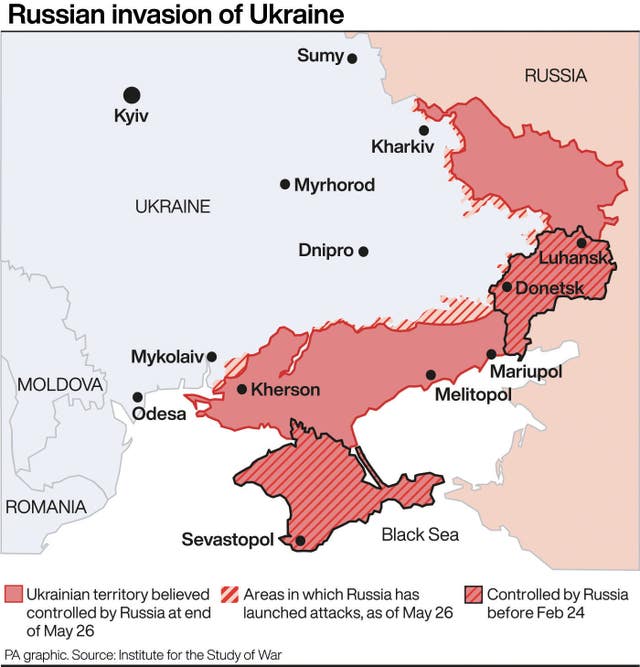
Matt Frei 10am - 12pm
28 May 2022, 11:44

Separatists backed by Russia have pounded the eastern area.
Moscow-backed separatists have pounded eastern Ukraine’s industrial Donbas region, as Ukrainian officials pleaded for sophisticated Western weapons to stop the onslaught.
The advance of Russian forces has raised fears that cities in the region will undergo the same horrors inflicted on the people of the port city Mariupol in the weeks before it fell.
The fighting in Donbas is focused on two key cities: Sievierodonetsk and nearby Lysychansk.

They are the last areas under Ukrainian control in Luhansk, one of two provinces that make up the Donbas and where Russia-backed separatists have already controlled some territory for eight years.
Authorities say 1,500 people in Sievierodonetsk have already died since the war began three months ago. Russia-backed rebels also said they have taken the railway hub of Lyman.
The governor of Luhansk, Serhiy Haidai, warned that Ukrainian soldiers may have to retreat from Sievierodonetsk to avoid being surrounded.
However, he predicted an ultimate Ukrainian victory, saying on Telegram: “The Russians will not be able to capture Luhansk region in the coming days, as analysts predict.

“We will have enough forces and means to defend ourselves.”
Ukrainian President Volodymyr Zelesnskyy also struck a defiant tone. In his nightly video address, he said: “If the occupiers think that Lyman or Sievierodonetsk will be theirs, they are wrong. Donbas will be Ukrainian.”
For now, Sievierodonetsk mayor Oleksandr Striuk told The Associated Press that “the city is being systematically destroyed – 90% of the buildings in the city are damaged”.
Mr Striuk described conditions in Sievierodonetsk reminiscent of the battle for Mariupol, located in the Donbas’ other province, Donetsk.
Now in ruins, the port city was constantly barraged by Russian forces in a near three-month siege that ended last week when Russia claimed its capture. More than 20,000 of its civilians are feared dead.

Before the war, Sievierodonetsk was home to around 100,000 people. About 12,000 to 13,000 remain in the city, Striuk said, huddled in shelters and largely cut off from the rest of Ukraine.
At least 1,500 people have died there because of the war, now in its 93rd day.
The figure includes people killed by shelling or in fires caused by Russian missile strikes, as well as those who died from shrapnel wounds, untreated diseases, a lack of medicine or being trapped under rubble, the mayor said.
In the city’s north-eastern quarter, Russian reconnaissance and sabotage groups tried to capture the Mir Hotel and the area around it, Mr Striuk said.
Hints of Russia’s strategy for the Donbas can be found in Mariupol, where Moscow is consolidating its control through measures including state-controlled broadcast programming and overhauled school curricula, according to an analysis from the Institute for the Study of War, a Washington think tank.

Russia’s aggressive push in Donbas could backfire, however, by seriously depleting Russia’s arsenal. Echoing an assessment from the British Ministry of Defence, military analyst Oleh Zhdanov said Russia was deploying 50-year-old T-62 tanks, “which means that the second army of the world has run out of modernised equipment”.
As Ukraine’s hopes of stopping the Russian advance fade, foreign minister Dmytro Kuleba has pleaded with Western nations for heavy weapons, saying it was the one area in which Russia had a clear advantage.
“Without artillery, without multiple launch rocket systems, we won’t be able to push them back,” he said.
Excellent meeting with Finnish Foreign Minister @Haavisto to discuss strong U.S. support for Finland’s application to join @NATO and deepening Transatlantic security cooperation. We reaffirmed the need for robust assistance to Ukraine against President Putin’s brutal war. pic.twitter.com/UrH7d5xAnw
— Secretary Antony Blinken (@SecBlinken) May 27, 2022
The US defence department would not confirm a CNN report that President Joe Biden’s administration was preparing to send long-range rocket systems to Ukraine, perhaps as early as next week.
“Certainly we’re mindful and aware of Ukrainian asks, privately and publicly, for what is known as a multiple launch rocket system. And I won’t get ahead of decisions that haven’t been made yet,” Pentagon spokesman John Kirby said.
Russian foreign minister Sergei Lavrov warned that providing rockets that could reach his country would represent “a most serious step toward unacceptable escalation”, in an interview with RT Arabic that aired on Friday.